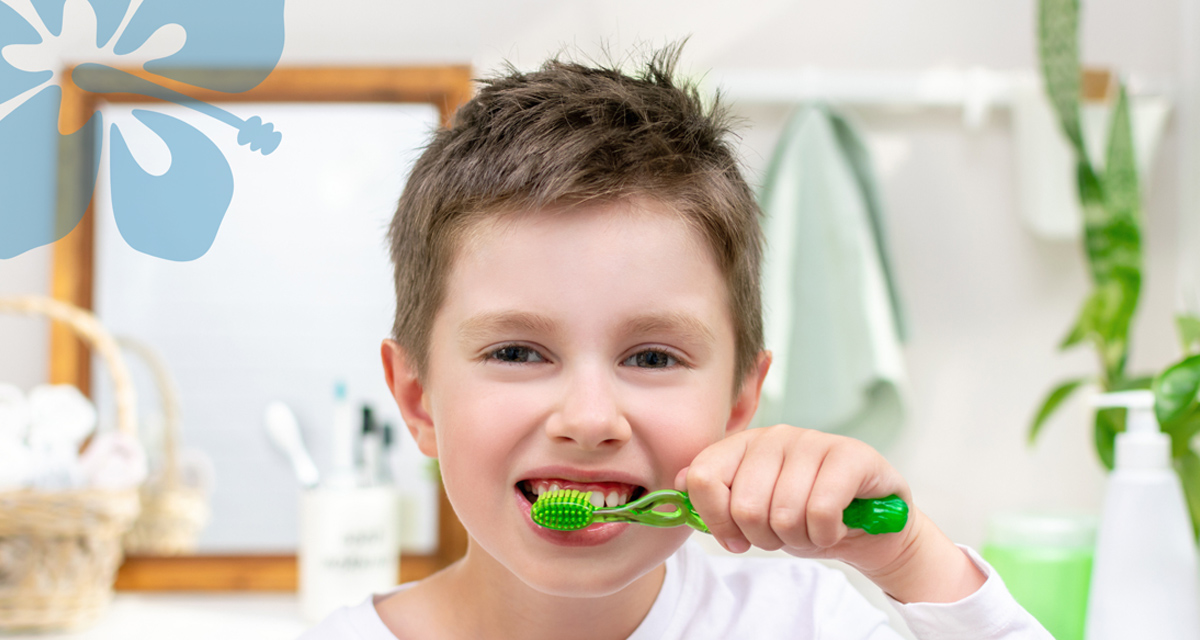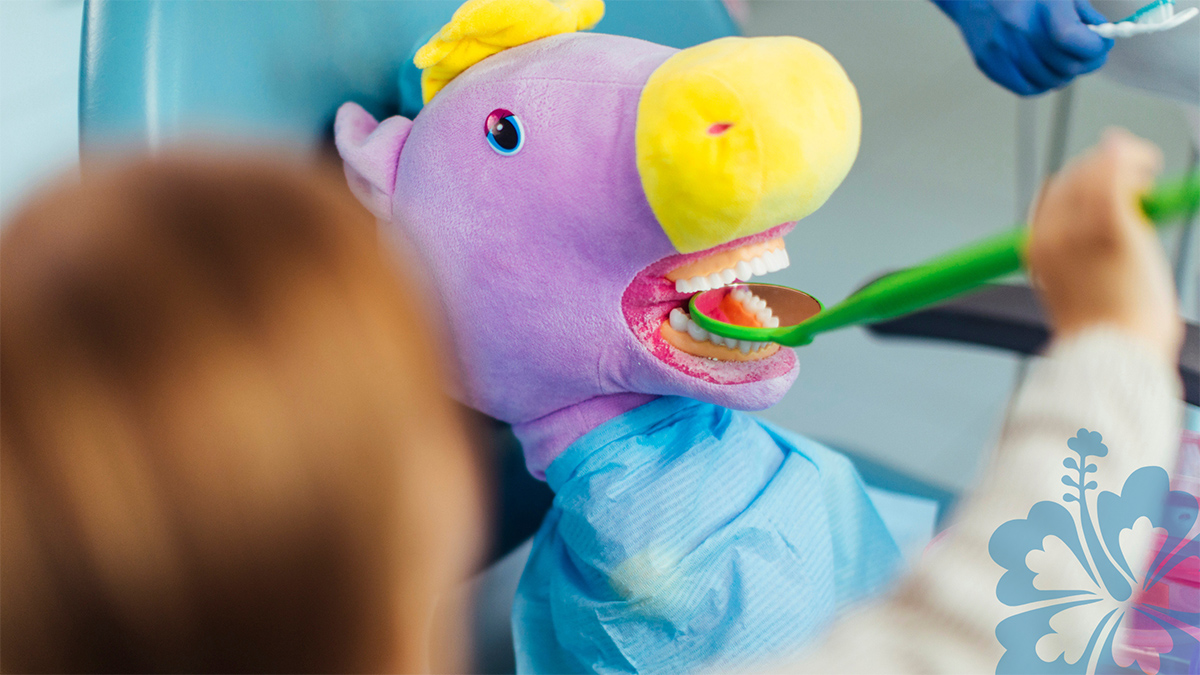Table of Contents
Toggle
February marks Children’s Dental Health Month, a nationwide initiative to raise awareness about the importance of oral health for kids. This annual event emphasizes the significance of building strong dental habits early, ensuring children enjoy a lifetime of healthy teeth and gums. Good dental care isn’t just about preventing cavities. It’s about fostering confidence, overall health, and a positive attitude toward oral hygiene.
Maintaining pediatric oral hygiene is crucial at every stage of a child’s growth. From the first tooth to managing braces during the teen years, proper care evolves as children grow. With targeted strategies, parents can lay the foundation for excellent children’s dental care and instill habits that will last a lifetime.
Oral Health Tips for Different Age Groups
Great oral health by age can look a little different depending on your child’s stage of childhood. Here are some strategies that can help children at every stage of oral development.
Toddlers (0-3 years)
Early oral care begins even before the first tooth appears. Cleaning your baby’s gums with a soft, damp cloth helps remove milk residue and reduces bacteria buildup.
Once teeth start erupting, brushing should become a daily routine.
- Brushing basics: Use a soft-bristled toothbrush and a smear of fluoride-free toothpaste until your child learns to spit.
- Avoid baby bottle tooth decay: Never let your child fall asleep with a bottle of milk or juice, as prolonged exposure to sugars can cause cavities.
- First dentist visit: Schedule a dental checkup by your child’s first birthday. This visit establishes a dental home and provides guidance on early children’s dental care.
Young Children (4–7 Years): Building Independence in Oral Hygiene
As kids grow, they start taking more responsibility for their own oral health, but they still need guidance.
At this stage, brushing and flossing should become daily habits.
- Supervised brushing: Ensure kids brush twice a day with a pea-sized amount of fluoride toothpaste. Help them reach all areas of the mouth until their motor skills improve.
- Introduce flossing: When teeth begin touching, flossing becomes essential to remove plaque from between them.
- Balanced diet: Encourage snacks like cheese, yogurt, and crunchy vegetables that promote strong teeth. Limit sugary treats to reduce the risk of cavities.
Pre-teens (8–12 Years): Reinforcing Consistency in Oral Care
Pre-teens are more independent but still require reminders about maintaining their oral health.
Consistency is key at this stage, as permanent teeth are settling in.
- Use mouthwash: Introduce alcohol-free mouthwash to enhance oral hygiene.
- Monitor sugar intake: Limit sugary sodas and snacks, which can erode enamel and lead to cavities. This can help lay the groundwork for a healthy diet that won’t interfere with braces and other orthodontic appliances.
- Encourage regular brushing: Two minutes twice a day is still the golden rule.
Teens: Managing Braces and Growing Responsibilities
Teenagers face unique dental challenges as they balance independence with increased dietary freedom.
As you prepare your child for their first orthodontic treatment, encourage them to prioritize their oral health despite their busy schedules.
- Braces care: Understanding the ideal age for braces for your teens and helping them access needed orthodontic care are important first steps that can lay the groundwork for a lifetime of beautiful smiles. For teens with braces, emphasize the importance of cleaning around brackets and wires to prevent plaque buildup.
- Maintain independence: Help teens stay consistent with brushing, flossing, and regular dental visits, especially as they take control of their health. These routines are essential for preventing long-term dental issues.
Common Dental Challenges by Age
Caring for children’s oral health involves addressing specific dental challenges that arise during different stages of growth. By understanding these common issues and implementing effective solutions, parents can help their kids maintain healthy, vibrant smiles as they grow. Below are some of the most typical dental challenges faced by toddlers, young children, pre-teens, and teens, along with actionable advice to prevent and manage these problems.
Baby Bottle Tooth Decay in Toddlers
Baby bottle tooth decay is one of the most prevalent dental issues in toddlers, often caused by prolonged exposure to sugary liquids like milk, formula, or juice. When these sugary substances remain on the teeth for an extended period, bacteria feed on the sugars and produce acid, which can erode tooth enamel and lead to cavities.
To prevent baby bottle tooth decay, parents should adopt the following practices:
- Avoid bedtime bottles with milk or juice: Allowing a child to sleep with a bottle can cause sugary liquids to pool around their teeth, increasing the risk of decay. If a bedtime bottle is necessary, fill it with plain water instead.
- Transition to cups by the first birthday: Switching from bottles to sippy cups helps reduce prolonged exposure to sugary drinks and encourages proper drinking habits.
By addressing this issue early, parents can protect their toddler’s developing teeth and create a solid foundation for lifelong oral health.
Cavities in Young Children
Cavities, or dental caries, remain one of the most common dental problems in young children. This is often due to a combination of factors, including inconsistent brushing, poor pediatric oral hygiene, and limited parental supervision during oral hygiene routines. If left untreated, cavities can cause pain and infection and even impact a child’s ability to eat or speak properly.
To reduce the risk of cavities, parents should focus on these dental health tips:
- Brush and floss regularly: Ensure children brush their teeth twice a day with fluoride toothpaste and floss daily once teeth begin to touch. Supervise their brushing to ensure proper technique and thorough cleaning.
- Limit sugary snacks and drinks: Sugary foods, sodas, and juices can erode tooth enamel over time. Encourage healthier options, such as fruits, vegetables, and dairy products that promote strong teeth.
- Schedule routine dental checkups: Professional cleanings and exams every six months allow dentists to detect and treat cavities early, preventing them from worsening.
By prioritizing preventive care, parents can help their children avoid the pain and complications associated with tooth decay.
Gum Problems in Pre-teens and Teens
Understanding unique issues in oral health by age matters. As children enter adolescence, hormonal changes can increase the risk of gum problems such as gingivitis, an early stage of gum disease characterized by swollen, red, or bleeding gums. Teens with braces or poor oral hygiene habits may be particularly susceptible to these issues.
To keep gums healthy during the pre-teen and teen years, consider the following tips:
- Emphasize proper brushing and flossing: Encourage teens to brush for two minutes twice a day, focusing on the gum line where plaque tends to accumulate. Flossing should also be part of their daily routine to remove food particles and plaque from between teeth.
- Monitor oral hygiene with braces: Braces can make it harder to clean teeth effectively, increasing the risk of gum inflammation. Teens with braces should use tools like floss threaders, interdental brushes, or water flossers to maintain healthy gums.
- Schedule professional cleanings: Regular dental visits are essential for removing plaque and tartar buildup that can contribute to gum problems. Dentists can also provide personalized advice to improve at-home care.
By addressing gum issues promptly, parents who have teens with braces can help their teens avoid more serious problems like periodontitis, which can cause irreversible damage to the gums and supporting structures of the teeth.
Making Oral Hygiene Fun: Engaging Tips for Kids of All Ages
Teaching kids about oral hygiene doesn’t have to be a struggle. By turning brushing and flossing into enjoyable activities, parents can help children view these routines as exciting rather than a chore. Fun, interactive methods can make a lasting impression and help kids develop healthy habits that stick.
Turn Brushing into a Game
Gamifying oral hygiene is an excellent way to engage kids. Use apps that transform brushing into a fun challenge where children earn rewards or progress through levels for completing their two minutes of brushing. Alternatively, create a family competition to see who brushes the most thoroughly or consistently.
Sing Along to a Favorite Tune
Music can make brushing time more enjoyable. Choose a two-minute song to play while brushing to keep kids entertained and ensure they brush long enough. For younger children, create silly brushing songs or find pre-made ones online that encourage good technique.
Use Colorful Brushing Tools
Children love bright, fun items, so let them pick out their toothbrushes and flossers featuring their favorite characters or vibrant colors. Electric toothbrushes with built-in timers and light-up features can also make the experience more exciting.
Storytelling with a Dental Twist
Incorporate stories that highlight the importance of oral hygiene. For example, you can tell a tale about a superhero fighting “cavity monsters” or read books that explain dental care in an engaging way.
By making oral hygiene fun and interactive, parents can instill positive habits that last a lifetime. Kids will not only look forward to their brushing routines but will also develop an appreciation for healthy teeth and gums.
Healthy Smiles at Every Stage: A Parent’s Role in Children’s Oral Health
Oral health plays a critical role in a child’s overall well-being, yet maintaining it requires consistent effort from both kids and their parents. Taking an active role in your child’s dental care can prevent many common issues and set the stage for lifelong healthy habits.
The Importance of Early Intervention
Starting good oral hygiene practices from a young age builds a strong foundation for the future. Parents should teach children proper brushing and flossing techniques and supervise these routines until the child is old enough to handle them independently. Early dental visits beginning around the child’s first birthday are also crucial for monitoring growth and addressing potential concerns.
Modeling Good Habits
Children often imitate their parents, so setting a good example is essential. Show them that oral health is a priority by brushing and flossing alongside them, maintaining regular dental checkups, and avoiding unhealthy habits like smoking or excessive sugar consumption.
Prioritizing Professional Care
Routine visits to the dentist ensure that issues like cavities or gum problems are caught early. Visits for checkups for their braces also provide a chance for the dentist to reinforce the importance of daily oral care and address any questions you may have.
Healthy teeth and gums contribute to a child’s confidence, overall health, and ability to enjoy everyday activities like eating and speaking. By fostering a proactive approach to oral care, parents can help their children enjoy a lifetime of strong, beautiful smiles.
Frequently Asked Oral Health FAQs

Maintaining good oral health is essential for overall well-being at any age. From preventing cavities in children to addressing gum health in older adults, every stage of life comes with unique dental care needs. Below, we answer some of the most common questions about oral health to help you care for your smile at every age.
Oral health affects more than just your teeth. It affects your overall well-being, including heart health and digestive health. Proper care prevents cavities, gum disease, and other health-related problems.
Teach brushing twice daily with fluoride toothpaste and encourage flossing. Limit sugary snacks and drinks to protect oral health and prevent cavities. Encourage older children to take charge of their own oral health but stay vigilant to ensure they are preventing oral health issues.
Orthodontic care, wisdom teeth, and lifestyle choices impact a teenager’s oral health. Regular checks are vital at this age to ensure proper development. Encourage continued oral hygiene practices and help your teen monitor any changes in their oral health.
Encouraging positive oral health in your children starts with modeling good habits. Adults should focus on regular cleanings, flossing, and addressing stress-related habits like grinding teeth. Brushing twice a day and regularly flossing remain important oral health habits.
If you have grandparents in the house, children can continue to recognize how oral health is crucial at any age. Seniors may experience dry mouth, tooth loss, or gum disease. Proper denture care and dental visits help maintain oral health. The realities of tooth loss can mean that seniors begin exploring the benefits of crowns, bridges, and dentures to restore oral health and function.
Contact Robison Orthodontics Today to Support Your Child’s Oral Health

Your child’s smile is a key part of their confidence and well-being. At Robson Orthodontics, we take a personalized approach to orthodontic care by offering tailored solutions to align teeth and improve oral health. From the first consultation to the final result, we are committed to providing expert care in a welcoming environment.
Our caring team understands the unique needs of growing children and works to ensure a comfortable and effective treatment experience at every stage of their orthodontic journey. You can trust that your child’s oral health and orthodontic needs are in caring and capable hands.
Contact Robison Orthodontics today to schedule your consultation.

Dr. Tyler Robison is an alum of Mesa’s Mountain View High School. He graduated from Brigham Young University before being accepted to the “Top Ten-nationally ranked” University of Louisville in Kentucky, where he earned his Doctorate in Dental Medicine and a Master’s Degree in Oral Biology. He graduated with honors in the top ten percent of his class. Dr. Robison continued at the University of the Pacific in San Francisco, where he received a second master’s degree in dental science and his orthodontic certification.


